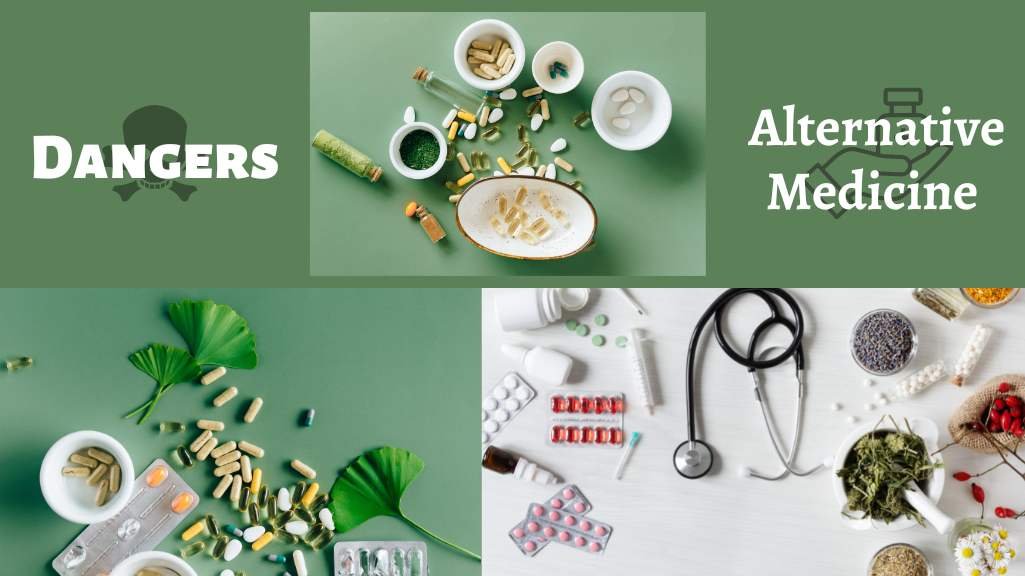The Dangers of Alternative Medicine: Risks and Side Effects
Aaron Alston
. 3 min read
Many different kinds of products, practices, and treatments are referred to as "alternative," "complementary," and "lifestyle" medicine. These terms are used to describe practices, products, and treatments that are not part of standard or conventional medicine. Complementary therapy typically refers to practices that are used in conjunction with conventional treatment, whereas alternative therapy refers to non-conventional forms of treatment that are used in place of conventional treatment. Lifestyle medicine is a relatively new field that emphasizes the prevention and treatment of illness through healthy eating, physical activity, and other healthy behaviors in lieu of the traditional medical practice of prescribing and taking medication.

The Benefits and Risks of Complementary Therapies for Cancer Patients
When used in conjunction with conventional treatment and under the supervision of a qualified medical professional, complementary therapies may assist cancer patients in experiencing improved quality of life. Many people are drawn to alternative and complementary therapies due to the fact that they make use of the patient's own body, the patient's own mind, or elements that can be found in nature. However, these practices will often make false claims that they can prevent, diagnose, or treat cancer, despite the fact that they have not been shown to be effective through scientific testing.
The Use of Complementary and Alternative Medicine by Chronic Illness Patients
Patients suffering from chronic illnesses who look into alternative therapies are likely to also make regular and consistent use of conventional medicine at the same time. On the other hand, they might not always tell their doctor that they are also using complementary or alternative medicine. For example, a study conducted in the United States by Eisenberg and colleagues showed that 96 percent of people who used alternative medicine also sought the help of a conventional medicine provider for at least one of their conditions. Overall, 28% of patients treated their medical condition with alternative medicine, but 72% of those patients did not inform their primary care physician.
Complementary and alternative medicine are associated with the following side effects
Increasing numbers of people are turning to complementary and alternative medicine (CAM) to diagnose or treat allergic diseases, and a great number of studies have documented the benefits of this category of treatment. Numerous herbal treatments have the potential to sensitize the skin, which can sometimes result in allergic contact dermatitis and, less frequently, clinical symptoms that are mediated
Infectious Complications and Toxicity Risks of Acupuncture and Herbal Remedies
Hepatitis and bacterial endocariditis are two examples of infectious complications that can arise after acupuncture treatment. Organ toxicity, including effects on the liver, kidneys, and heart, has been observed in connection with the use of a variety of herbal preparations. There is a possibility that certain herbs could cause cancer. When infants and young children are placed on restrictive alternative diets, severe nutritional deficiencies similar to kwashiorkor can develop in these individuals. In conclusion, a variety of unexpected side effects, including adulteration with steroids and interactions between herbal remedies and pharmaceuticals, are covered in this section.
Complementary Medicine in Australia: Health and Legal Concerns
According to some estimates, the percentage of people living in Australia who make use of complementary medicines or consult with complementary therapists is growing. Nevertheless, there are a great number of health and legal concerns associated with their use. In terms of treatment, the Ipp Report suggested that the law in Australia should be changed to reflect the decision made by the House of Lords in the case Bolitho v. City and Hackney Health Authority. This was one of the recommendations made by the report.
Essential Considerations for Using Alternative Medicine: Risks and Uncertainties
There are a few essential considerations that need to be made before beginning treatment with an unconventional form of alternative medicine. The following concerns should not prevent you or someone you care about from using alternative medicine; rather, they should offer more information that can be used in the process of decision-making. However, when compared to more conventional medical practices, the evidence is still lacking, and as a result, many questions remain unanswered.
The Misuse of the Term 'Natural' in Alternative Medicine: Interactions and Consequences
The term "natural" is used incorrectly on the labels of a great number of dietary supplements and herbal remedies, both of which are classified as alternative medicines. Interactions that could turn out to be harmful. Supplements and herbs can still have the potential to interact negatively with both prescription and over-the-counter medications, even in cases where the product in question does not contain any artificial substances. And some of these natural products come with their own set of unintended consequences. When compared to studies on conventional medicine, those dealing with alternative medicine typically have a smaller number of participants, fewer effective controls, and no direct point of comparison.
The Distinction between Alternative and Complementary Medicine
It may seem like stating the obvious to say that alternative medicine is anything but, but alternative medical treatments are used in place of conventional medical treatments. Although the terms are often used interchangeably, complementary medicine and alternative medicine are not the same thing. Alternative medicine is meant to completely replace conventional medicine as part of a patient's treatment process, whereas complementary medicine is used to supplement traditional medical methods.
More Stories from
Maintaining Healthy Blood Pressure: Essential Tips for a Balanced Life
Learn how to maintain healthy blood pressure levels with these essential tips. Discover the importance of monitoring, embracing a heart-healthy diet, maintaining a healthy weight etc.
Understanding Frontotemporal Dementia: Types, Stages, Symptoms, and Treatment Options
This article provides an overview of frontotemporal dementia, a degenerative brain illness that affects behavior, language, and movement.
Advancements in Medical Technology: Improving Healthcare Access
Embrace the future of healthcare with these advancements, fostering a more inclusive and accessible healthcare system for all.
Cognitive Enhancers: The Ethics and Implications of Brain-Boosting Drugs
Explore the ethics and implications of cognitive enhancers, also known as "smart drugs," that promise improved cognitive abilities.
The Versatile Guava: A Fruit with a Multitude of Uses
From its delightful taste in culinary creations to its potent health benefits and skincare properties, guava has become a beloved fruit worldwide.











.png?width=40&aspect_ratio=1:1)
